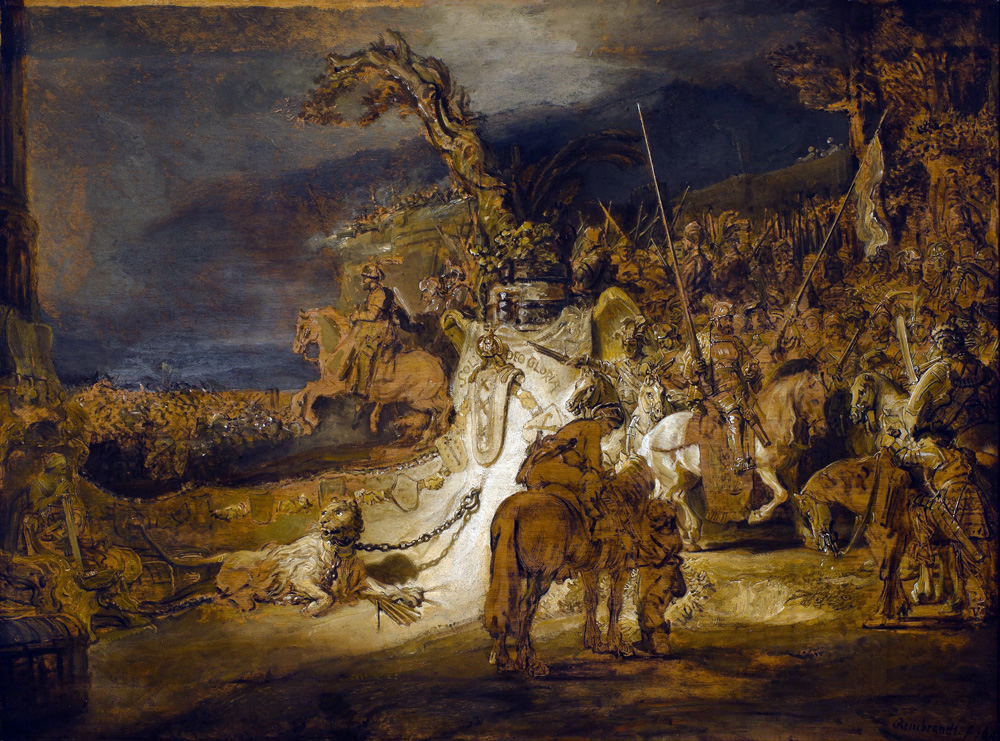The whole aim of practical politics is to keep the populace alarmed (and hence clamorous to be led to safety) by menacing it with an endless series of hobgoblins, all of them imaginary.
—H.L. Mencken, 1921Do the Right Thing
Athens debates vengeance and mercy.
The Athenians decided to put to death the entire adult male population of Mytilene and to make slaves of the women and children. What they held against Mytilene was the fact that it had revolted, even though it was not a subject state, like the others, and the bitterness of their feelings was considerably increased by the fact that the Peloponnesian fleet had actually dared to cross over to Ionia to support the revolt. This, it was thought, could never have happened unless the revolt had been long premeditated. So they sent a trireme to Paches, the general who had been sent to put down the revolt, to inform him of what had been decided, with orders to put the Mytilenians to death immediately.
Next day, however, there was a sudden change of feeling, and people began to think how cruel and how unprecedented such a decision was—to destroy not only the guilty, but the entire population of a state. Observing this, the deputation from Mytilene, which was in Athens, and the Athenians who were supporting them approached the authorities with a view to having the question debated again. They won their point the more easily because the authorities themselves saw clearly that most of the citizens were wanting someone to give them a chance of reconsidering the matter. So an assembly was called at once. Various opinions were expressed on both sides, and Cleon, the son of Cleaenetus, spoke. It was he who had been responsible for passing the original motion for putting the Mytilenians to death. He was remarkable among the Athenians for the violence of his character, and at this time he exercised by far the greatest influence over the people. He spoke as follows:
“Personally I have had occasion often enough already to observe that a democracy is incapable of governing others, and I am all the more convinced of this when I see how you are now changing your minds about the Mytilenians. Because fear and conspiracy play no part in your daily relations with each other, you imagine that the same thing is true of your allies, and you fail to see that when you allow them to persuade you to make a mistaken decision and when you give way to your own feelings of compassion, you are being guilty of a kind of weakness that is dangerous to you and that will not make them love you any more. What you do not realize is that your empire is a tyranny exercised over subjects who do not like it and who are always plotting against you; you will not make them obey you by injuring your own interests in order to do them a favor; your leadership depends on superior strength and not on any goodwill of theirs. And this is the very worst thing: to pass measures and then not to abide by them. We should realize that a city is better off with bad laws, so long as they remain fixed, than with good laws that are constantly being altered, that lack of learning combined with sound common sense is more helpful than the kind of cleverness that gets out of hand, and that as a general rule states are better governed by the man in the street than by intellectuals. These are the sort of people who want to appear wiser than the laws, who want to get their own way in every general discussion, because they feel that they cannot show off their intelligence in matters of greater importance, and who, as a result, very often bring ruin on their country. But the other kind—the people who are not so confident in their own intelligence—are prepared to admit that the laws are wiser than they are and that they lack the ability to pull to pieces a speech made by a good speaker; they are unbiased judges and not people taking part in some kind of a competition, so things usually go well when they are in control. We statesmen, too, should try to be like them, instead of being carried away by mere cleverness and a desire to show off our intelligence and so giving you, the people, advice which we do not really believe in ourselves.
“As for me, I have not altered my opinion, and I am amazed at those who have proposed a reconsideration of the question of Mytilene, thus causing a delay which is all to the advantage of the guilty party. After a lapse of time, the injured party will lose the edge of his anger when he comes to act against those who have wronged him; whereas the best punishment and the one most fitted to the crime is when reprisals follow immediately. I shall be amazed, too, if anyone contradicts me and attempts to prove that the harm done to us by Mytilene is really a good thing for us, or that when we suffer ourselves we are somehow doing harm to our allies. It is obvious that anyone who is going to say this must either have such confidence in his powers as an orator that he will struggle to persuade you that what has been finally settled was, on the contrary, not decided at all, or else he must have been bribed to put together some elaborate speech with which he will try to lead you out of the right track.
“I say that no single city has ever done you the harm that Mytilene has done. Personally I can make allowances for those who revolt because they find your rule intolerable or because they have been forced into it by enemy action. Here, however, we have the case of people living on an island, behind their own fortifications, with nothing to fear from our enemies except an attack by sea against which they were adequately protected by their own force of triremes; they had their own independent government and they were treated by us with the greatest consideration. Now, to act as they acted is not what I should call a revolt (for people only revolt when they have been badly treated); it is a case of calculated aggression, of deliberately taking sides with our bitterest enemies in order to destroy us. And this is far worse than if they had made war against us simply to increase their own power. They learned nothing from the fate of those of their neighbors who had already revolted and been subdued; the prosperity that they enjoyed did not make them hesitate before running into danger; confident in the future, they declared war on us, with hopes that indeed extended beyond their means, though still fell short of their desires. They made up their minds to put might first and right second, choosing the moment when they thought they would win, and then making their unprovoked attack upon us.
“The fact is that when great prosperity comes suddenly and unexpectedly to a state, it usually breeds arrogance; in most cases it is safer for people to enjoy an average amount of success rather than something that is out of all proportion; and it is easier, I should say, to ward off hardship than to maintain happiness. What we should have done long ago with the Mytilenians was to treat them in exactly the same way as all the rest; then they would never have grown so arrogant, for it is a general rule of human nature that people despise those who treat them well and look up to those who make no concessions. Let them now therefore have the punishment that their crime deserves. Do not put the blame on the aristocracy and say that the people were innocent. The fact is that the whole lot of them attacked you together, although the people might have come over to us and, if they had, would now be back again in control of their city. Yet, instead of doing this, they thought it safer to share the dangers and join in the revolt of the aristocracy.

The Concord of the State, by Rembrandt van Rijn, 1637–1645. Museum Boijmans Van Beuningen, Rotterdam.
“Let hope be held out to the Mytilenians that we, either as a result of a good speech or a large bribe, are likely to forgive them on the grounds that it is only human to make mistakes. There was nothing involuntary about the harm they did us; they knew what they were about, and they planned it all beforehand, and one only forgives actions that were not deliberate. As for me, just as I was at first, so I am now, and I shall continue to impress on you the importance of not altering your previous decisions. To feel pity, to be carried away by the pleasure of hearing a clever argument, to listen to the claims of decency are three things that are entirely against the interests of an imperial power. Do not be guilty of them. As for compassion, it is proper to feel it in the case of people who are like ourselves and who will pity us in their turn, not in the case of those who, so far from having the same feelings toward us, must always and inevitably be our enemies. As for the speech makers who give such pleasure by their arguments, they should hold their competitions on subjects which are less important, and not on a question where the state may have to pay a heavy penalty for its light pleasure, while the speakers themselves will no doubt be enjoying splendid rewards for their splendid arguments. And a sense of decency is only felt toward those who are going to be our friends in the future, not toward those who remain just as they were and as much our enemies as they ever have been.
“Let me sum the whole thing up. I say that, if you follow my advice, you will be doing the right thing as far as Mytilene is concerned and at the same time will be acting in your own interests; if you decide differently, you will not win them over, but you will be passing judgment on yourselves. For if they were justified in revolting, you must be wrong in holding power. If, however, whatever the rights or wrongs of it may be, you propose to hold power all the same, then your interest demands that these too, rightly or wrongly, must be punished. The only alternative is to surrender your empire so that you can afford to go in for philanthropy. Make up your minds, therefore, to pay them back in their own coin, and do not make it look as though you who escaped their machinations are less quick to react than they who started them. Remember how they would have been likely to have treated you, if they had won, especially as they were the aggressors. Those who do wrong to a neighbor when there is no reason to do so are the ones who persevere to the point of destroying him, since they see the danger involved in allowing their enemy to survive. For he who has suffered for no good reason is a more dangerous enemy, if he escapes, than the one who has both done and suffered injury.
“I urge you, therefore, not to be traitors to your own selves. Place yourselves in imagination at the moment when you first suffered and remember how then you would have given anything to have them in your power. Now pay them back for it, and do not grow soft just at this present moment, forgetting meanwhile the danger that hung over your heads then. Punish them as they deserve, and make an example of them to your other allies, plainly showing that revolt will be punished by death. Once they realize this, you will not have so often to neglect the war with your enemies because you are fighting with your own allies.”
© 1954 by Rex Warner. Used with permission of Penguin Books Ltd.

Thucydides
From History of the Peloponnesian War. The assembly decided not to follow through on the severe proposal, but Thucydides claims that one thousand of the revolt’s leaders were executed without trial at Cleon’s request. Among the first prominent Athenian politicians of the commercial class, Cleon emerged as a leader of the democracy around the start of the Peloponnesian War, following the death of his opponent Pericles in 429 bc. He was killed, along with six hundred other Athenians, in a battle against the Spartans at Amphipolis in 422 bc.




